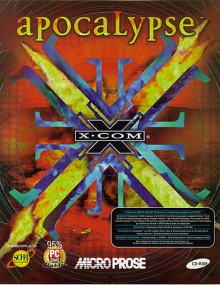X-COM: Apocalypse (PC) Review
By Eric Ace  01.07.2017
01.07.2017

X-COM: Apocalypse was the last of the original trio of X-COM games that revolutionised gaming, with its varied strategies from base management to an RPG stat system of soldiers, with the goal of defeating an attacking alien horde. Developed by defunct Mythos Games and published by MicroProse, this was a game completely ahead of its time when it was released in 1997. Unlike the first two, this focuses on the last city of humanity, fighting against dimensional aliens. With only one city wall separating the city from the wasteland, you alone have to save humanity.
X-COM: Apocalypse is a perfect example of what gaming once strove for: wildly ambitious, simple yet deep, full of emergent gameplay, and repayable without sacrificing anything on a single campaign. To understand the intensity this game brought to the 1997 gamer, just listen to a song from it, a battle tune when things were at their hottest. Humanity has been reduced to one single mega city left on Earth. Walled off from the wasteland, everything is going okay until aliens find a way to teleport straight into the city.
The game takes place isometrically, both in the 'cityscape' and the battle. On the city, the player must build and manage bases to best respond to the unpredictable alien threat. This ranges from researching new tech, building vehicles, arming soldiers and managing politics with finances. Aesthetically, everything has a retro sci-fi look of sleek hover cars, for example, which helped it stand out. The primary thing here was fielding and equipping appropriate vehicles to fight against the UFOs that will be descending very quickly.

Everything about X-COM: Apocalypse was far ahead of its time. Even the corporations had lives of a sort; they had their own money, their own politics with other corporations. If you were favoured enough, they allowed the sale of arms, or use of city streets, and so on. The game feels alive, as they interacted with people beyond just the player. It is always a laugh watching a big war get launched from one group to another.
The bases are underground, and much of it was similar in terms of placing buildings on a limited tile. There are two major branches of research - physics and bio - with even the scientists having different skill levels. Soldiers have upgradeable stats, like the rest of the series, with one major update of having fixed inventories, meaning the player can permanently give the strong guy the rocket launcher, the accurate guy the sniper rifle, and so on. This tied wonderfully in with the battle system, as there are multiple strategies, such as having soldiers with 10+ grenades on them, and the like.
The battle system went two separate ways compared to older X-COMs. There is still the time unit mode, but it's far different. Instead of a shot usually taking 1/3 of the total TU or more, it was based on the gun, such as machine guns could fire entire clips. The turn-based mode is not that good; it just doesn't feel right compared to the older ones. Luckily, there is the real-time mode, which is what makes the game come alive.

In the pause-able real time, players put in the commands and then are executed, while aliens are moving, as well. Every stat here feels much more important, as speed is obvious, as the soldiers fly much faster across the battlefield, or endurance, as they slow to a crawl, and so on. The real magic is how realistic everything is. The terrain is destructible (something not seriously seen until many years later, in which many games still lack today) and change while the fight is underway. Catwalks can be shot out, fires can spread, and missile plants can be levelled. Every map is unique and fun.
With real time, the player can have soldiers dual wield their guns, for which ammo is limited, but the fire power is a sight to behold. There is something oddly satisfying of a single alien popping into view, the music kicking in, and a hail of bullets from all directions descending. Only a fraction hits the alien, the rest levels the building around, but that only adds to the fun.
X-COM: Apocalypse fits together on so many levels. The great music is ever present, with its creepy atmosphere, such as this. The challenge of trying to keep those pesky politicians happy while levelling their city in the name of alien destruction is a great way to help draw the player into the world. Having to write sections of the city off due to infestations or politics are things not seen much anymore. Getting that first useably alien tech, or some new weapons, changed the battle and makes it exciting to try new things.

Every game had the same basics, but every game was different. Were there going to be more gang trouble? Aliens blitzing some advanced craft that couldn't be stopped? Some lucky battle goes the player's way? In this regard, it blows modern "XCOM" games away with the scripted points, not letting the emergent gameplay happen. Further, the story was told through things like the research, so it was never in your face, but had enough subtly to really build a world, such as an implication that the devastator cannon weapon was from a previous race that had been defeated.
What is crazy is that as great as this game was, there is much hidden in its code that got cut, indicating they had even more planned. There are still glitched weapons that can be found, things like "mind shields" or "trekker guns" that suggested there was to be a more involved political system, among other things. Unfortunately, development problems reared their head, and parts of this classic were left unfinished and hidden.
In the end, it really comes down to a great experience all around. Taking a ragtag group of people with inferior weapons and slowly resisting the tide is captivating. As the game shifts and the player gains the momentum, it is a great feeling blowing UFOs out of the sky and levelling the battlefield with the dual-wielding devastator cannons.

Cubed3 Rating
Exceptional - Gold Award

Literally the only thing stopping X-COM: Apocalypse from being perfect is its graphics and some minor balance tweaks. Everything from a political system, to managing vehicles, to personally equipping soldiers gives an overall feeling of being invested in the game world. The challenge of being overrun for most of the game, as the tide slowly turns to having unstoppable firing lines, gives a feeling long since gone in modern gaming. For strategy players, they would do well to look past the graphics and give this gem a try, easily found for free online as abandonware.

![]() 9/10
9/10
![]() 0
(0 Votes)
0
(0 Votes)
 Out now
Out now  Out now
Out now  Out now
Out now  Out now
Out now Comments
Comments are currently disabled

 Sign In
Sign In Game Details
Game Details Subscribe to this topic
Subscribe to this topic Features
Features







 Top
Top

